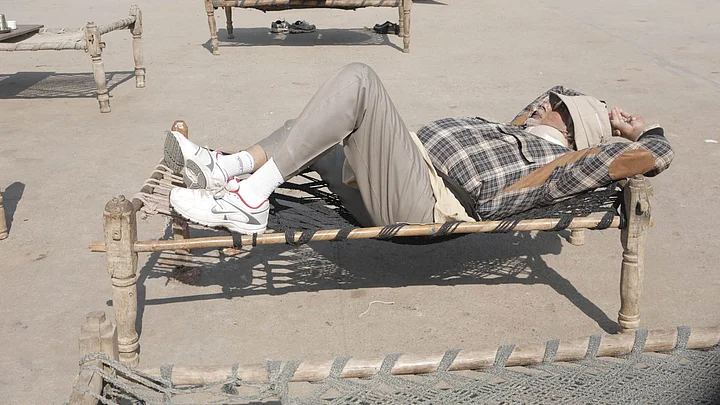People with Parkinson’s Disease have more sleep disruptions than others at the same age, partly caused by the disease itself and partly by the medication given to treat it.
My father, Anna struggles with sleep. He sleeps fairly early in the night, 9:30-ish, stretched out on his back, fingers clasped high over his chest, impersonating a praying mantis. His sleep is disturbed by vivid dreams, nightmares, frequent urination, intense leg ache, and talking in his sleep.

He also naps/sleeps a lot during the day time. Perhaps to recoup the sleep lost in the night. In a 24-hour period, he sleeps approximately 13–14 hours, always napping after a meal, like an infant. However, even daytime sleep can be as disturbed as his night time sleep.
I have also found that if he is woken from deep sleep, his disorientation increases. Either his dream continues while he is awake, or he is confused about the time of day, or where he is, or what he should do. So often, we let him sleep and adjust food and exercise timings accordingly.
Each morning, when I go to wake him, I am not sure if he will be wide awake, or in a semi-somnambulant state. Each morning, I will ask him (and his attendant) the same questions. How did he sleep? Did he dream? Was it a nightmare? Were there any instances of vocalisation? Did he complain of body ache? How many times did he urinate? Was the volume of urination commensurate with liquid intake?
Who Says You Can’t be Paid for Sleeping?
So a couple of days ago, when we woke Anna up for his early morning cup of coffee, he seemed to be half asleep. His eyes were closed, sitting at the dining table, patiently waiting for the steaming cup of South Indian coffee. I asked all the usual questions, to which, I got monosyllabic responses. I thought I wouldn’t be able to have a real conversation, till….

Me: “Anna, you said you slept well last night. But why are you still sleepy?”
Anna: “Because I am.”
If he were a young adult, I am sure this response would include a “Duh!” at the end. I also think of how irritated he would get when, as teenagers, we responded in the same fashion to his questions!
Me: “OK. Drink your coffee.”
The coffee has been placed in front of him and I wrap the fingers of his right hand around the mug handle.
He lifts it to take a sip. I watch him carefully, ready to jump and grab the cup, if it slips, as it is at its usual 45-degree angle.
Anna puts the cup
down and says, “I have made a profession of sleeping.”
Me: “Yes Anna.” Not
sure where this is going.
Anna: “If I got paid
to sleep, I’d be a rich man.”
He smiles. I laugh.
Even in his semi-sleep state, his wit is far, far better than mine!
We finish coffee in silence.

Me: “Anna, what do you want to do? Read the paper or take a nap?” He has always chosen to nap, but I still ask the question anyway.
Anna: “Nap. I am a professional.”
I smile as Anna shuffles his way to bed, assisted by his attendant.
Things that Help Anna Sleep Better
1. Exercise. Although Anna shuffle walks and covers only a few metres at a time, I insist that he walk or exercise at least two times a day.
2. Sunlight. An hour of sunlight helps not just with sleep, but also his depression and body ache. He is no longer on pain medication and takes it as SOS only.
3. No caffeine after 7:30 pm. We do not let him drink coffee or sodas after 7:30 pm.
4. Limited volume of liquids after 7:30 pm. This helps reduce the number of times he needs to wake up to urinate.
5. Light dinner. Dinner time is 8:15 pm. Anna will often have upma, or soup and toast, or khichadi or poha for dinner.
6. Fixed times to sleep/nap. I have built a schedule for Anna that fixes times to nap/sleep. Definitely after a meal and a bath.

7. Never wake up someone from deep sleep.
8. The TV is in another room not in his bedroom.
9. Sleep medication 15 minutes before getting into bed helps.
(After working in corporate India for over 29 years, Sangeeta has taken time off to look after her father, who was diagnosed with Parkinson’s Disease in 2008. Sangeeta hopes that these authentic stories will help patients and caregivers understand and appreciate the impact of Parkinson’s Disease. You can follow Sangeeta’s blog here.)
Related Links in the Series
How my Father, the Parkinson’s Patient, Aced the Spoken Word
The Six-Day Merry-Go-Round
The Story of How My Father Learned to Swim
My Father’s Love of Sweet Things Knows No Bounds
From a Real Life Piku: Looking After an Elderly ‘Child’
‘Anna’: My Father’s Tryst With Speed
Dealing with Dependence: A Daughter’s Tale of her Father
What Happened the First Time My Father Visited My Office
Would You Believe My Father’s Tale of Battling a Crocodile?
(At The Quint, we question everything. Play an active role in shaping our journalism by becoming a member today.)
